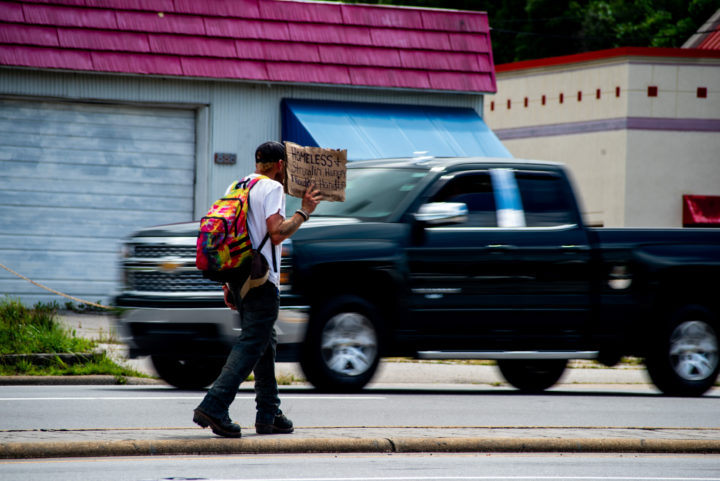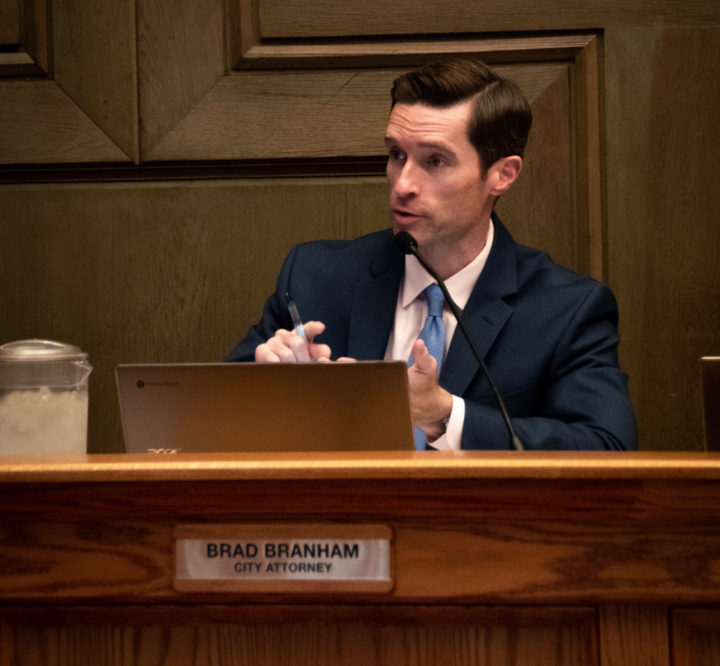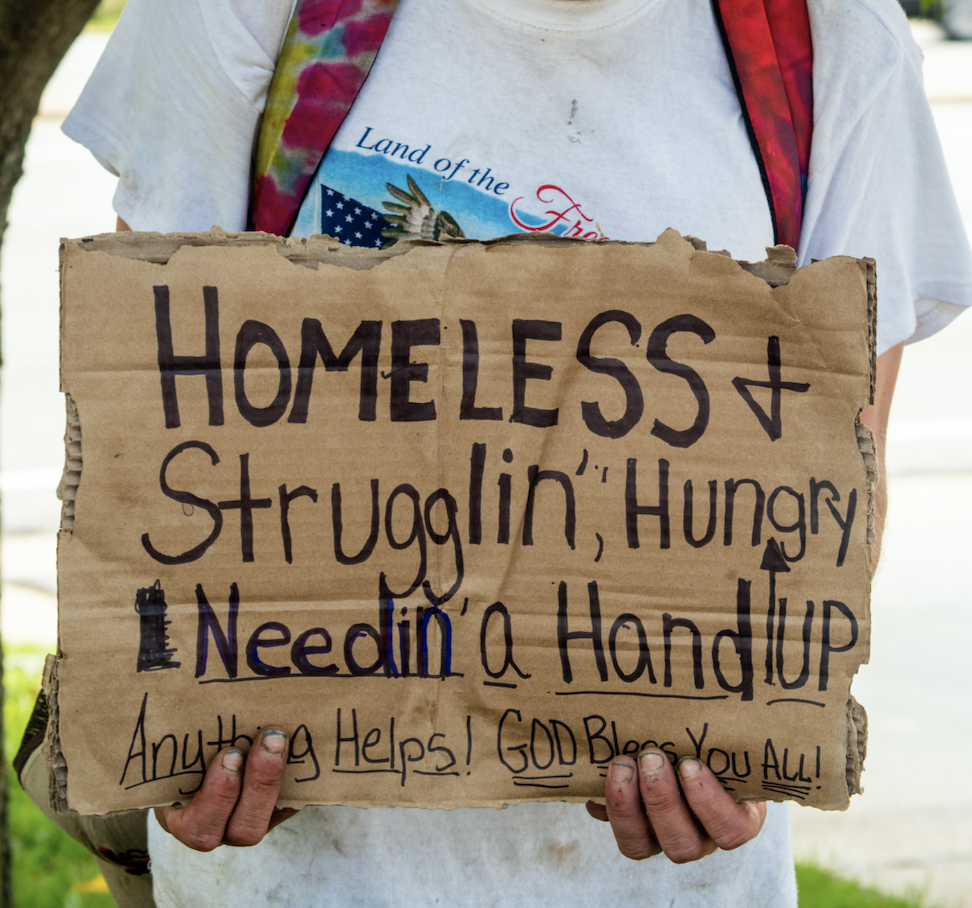UPDATE: Monday, Aug. 21, 12:03 p.m. — Following this story’s Aug.16 print publication, Asheville City Council released its agenda for the Tuesday, Aug. 22 regular meeting which excluded the most controversial of the proposed changes to the city’s solicitation ordinances — including a proposal that would regulate how and when drivers can give to roadside solicitors — from consideration. Instead, Council is expected to vote on minor changes meant to clarify, rather than expand, the city’s existing panhandling laws.
Most days, rain or shine, 57-year-old Ken Putnam stands at the corner of Regent Park Boulevard and Patton Avenue to ask for money.
After working as a stone layer for most of his life, Putnam says that an injury and other misfortunes caused him to not only lose his livelihood but prevented him from finding work. Within a few years, Putnam was homeless.
“I’m having to start over again. I’ve filed for housing, but there’s so many people here wanting housing,” says Putnam, who has lived in Asheville since 2016.
Today, he survives on disability payments and the kindness of strangers.
Some days, Putnam explains, he will stand in the same location for hours only to walk away with $1 or less. On a good day, he may receive as much as $50, which he says covers his basic needs.
“I’ve got three priorities: water, food and clothing every day. Those are my essentials,” Putnam explains.
Asking for money, otherwise known as panhandling or flying a sign, is illegal in Asheville in most circumstances. But in spite of the city’s laws, the practice has become a common feature along roadways and on traffic medians in Asheville.
Today, city leaders are considering tightening Asheville’s ordinances — including adding regulations as to how and when drivers can give to roadside solicitors — in an effort to reduce panhandling.
A city divided
Giving money to panhandlers has been hotly debated among residents, homelessness services providers, business owners and city leaders in Asheville for decades. And an agreement doesn’t seem any closer.
Those who oppose panhandling question the legitimacy of some of the people who are asking, noting that some solicitors seem to work in shifts. Others maintain that they feel genuine concern for homeless residents but that handing over cash might fuel drug and alcohol addiction and ultimately endanger the lives of those whom they are trying to help.
“I have a huge soft spot for those struggling with addiction, but under no circumstances will I give them money to kill themselves with,” says Asheville resident Brian Ingle, who answered an Xpress call for comment on the topic. “It furthermore complicates things to where it’s almost impossible to discern who’s really down on their luck and needs help versus those funding addiction.”
Those who support giving panhandlers cash or other resources say criminalizing the practice further degrades some of Asheville’s most vulnerable residents.
“In recent years the City of Asheville has seemed to focus less and less on helping the homeless and more on eliminating them from the view of tourists,” says former Hendersonville resident Sophie Tanker, who also responded to an Xpress appeal for comment. “The city makes its money through tourism campaigns that act like this city is a sanctuary for bleeding-heart liberals that want to change the world and save the planet. Then act like it. Put your money and effort into helping the homeless instead of criminalizing them.”
David Nash, interim executive director at Homeward Bound, says that the nonprofit doesn’t have a stance on panhandling but maintains that concerned residents and leaders should focus on housing as a solution to homelessness.
“I think it is pretty dangerous for somebody to be standing in a median on Tunnel Road or on I-240 in West Asheville on those tiny little raised areas and collecting money. So, I agree with the safety concern,” says Nash. “I think what we can all do as a community is invest more in permanent housing solutions so that people don’t have to be standing in the middle of the highway trying to raise money.”
Representatives from BeLoved Asheville and the Asheville Buncombe Community Christian Ministry did not return requests for comment before press time.
Some homeless residents who spoke with Xpress feel that they are left out of the conversation around panhandling, even though they are most directly affected by the ordinances. Putnam acknowledges that some of those asking for money are overly aggressive toward drivers or leave behind trash. Still, he says that mental illness, injuries or substance abuse issues often keep panhandlers from finding stable employment, leaving them few options.

“Most of these people have had a very hard life. Most of them can’t help that,” says Putnam. “Not all of us are criminals.”
“The Council, or mayor or whoever has a problem with all this, they’re not willing to come out and talk to the homeless,” adds one homeless woman who wishes to remain anonymous to preserve future housing or employment opportunities. “[People] are gonna do what they need to do to support themselves. If it ain’t panhandling or flying a sign, they’re gonna find something else to do. It might be robbing somebody. It might be breaking in places. They got to do what they got to do to [take care of] themselves.”
Law of the land
While panhandling is protected under the First Amendment of the Constitution, local governments can regulate it in order to ensure the safety of the general public as well as the individuals engaging in the activity.
Sections 11-5 and 11-14 of the Asheville city code prohibit people from soliciting for money or accepting contributions from medians or roadways unless they obtain a permit issued by the city. City Attorney Brad Branham notes that the permitting process is managed collaboratively by Asheville’s Transportation Department and the Asheville Police Department, though permits are rarely requested.
Residents can solicit money and other resources from the sidewalk without a permit but must remain at least 6 feet from people and refrain from using threatening language or profanity when asking. Solicitors cannot ask for money in an outdoor dining area, while riding or waiting for public transit, when under the influence of illegal drugs or alcohol or after dark, and must be at least 20 feet away from a financial institution or ATM.
Asheville’s law also prohibits panhandling in “high-traffic zones.” Those areas currently include all of Biltmore Village and a roughly 0.3-square-mile section of downtown covering most streets east of French Broad Avenue and north of Hilliard Avenue.
Violations are misdemeanors, meaning officers can issue a warning or a citation up to $50 or make an arrest.
But having a law on the books is one thing, while enforcement is another. Asheville Police Department spokesperson Samantha Booth says that increased panhandling is a symptom of APD’s diminished workforce, now about 40% below full capacity. Officers have to prioritize more serious matters.
“With already low staffing levels, an arrest for panhandling would take an officer off the street for an extended amount of time,” says Booth. “Officers have less discretionary time to conduct proactive enforcement due to low staffing levels. When a critical incident like a shooting occurs, this (type of) incident typically ties up all officers working that day.”
Booth says that in 2022, APD issued 223 citations for panhandling and made 14 arrests when panhandling was associated with other charges. In the first seven months of 2023, 106 citations were issued and eight people were arrested in conjunction with other charges.
Making change
The city’s panhandling laws were discussed during the July 25 meeting of the Environment and Safety Committee, which consists of Council members Maggie Ullman, Sandra Kilgore and Sheneika Smith.
City Attorney Branham said during the meeting that Asheville’s solicitation ordinances haven’t been updated in more than two decades and the changes proposed would “further clarify and simplify the language around the who, what and when of solicitation.”
But discussion among the committee members led to additional proposed amendments, including adding regulations around drivers giving money or other resources from their vehicles. Branham noted that Charleston, S.C. has had a similar law on the books since 2015 in which violators caught giving money or goods from a car on a city street may be fined up to $1,092 or spend 30 days in jail. Local reporting suggests that the law has reduced panhandling in that city.

Other changes would increase the distance that solicitors must be from those they are asking from 6 feet to 10 feet and expand the high traffic zones to include Haywood Road in West Asheville and the River Arts District.
“I know that sometimes the folks who are panhandling are in really dire straits, and the acts that they’re taking are uncomfortable and in many places unlawful and infringing on other citizen’s rights,” Ullman said during the meeting. “This well-intended generosity … it’s coming from a really good place. But I don’t know if it’s helping address the root cause, and it might be reinforcing these what I think are dangerous activities.”
Ullman said she would like to see a citywide information campaign to redirect charitable efforts toward area nonprofits that work with homeless residents. Asheville once had a Spare Change for Real Change program, led by the Asheville Downtown Association, which directed donations away from panhandlers and toward local organizations working on behalf of the homeless. The ADA placed small black boxes around downtown that people could put money into instead of giving it to a panhandler. The initiative began in 2007, but representatives from the ADA did not respond to questions about when or why the program ended.
All three committee members approved the changes during the meeting. Those amendments and other changes will now come before the full Council for approval later this month. Branham told Xpress after the meeting that while giving money is constitutionally protected, he says other cities have found ways to place limits when safety concerns are at issue.
“Until we have completed that analysis, I can’t yet say for certain what specific proposals will be made to the City Council. However, there are no plans to outright ban giving, from vehicles or otherwise,” he explained. “The city’s considerations are strictly focused on the potential need to impose rules around this activity in order to enhance the safety of both drivers and pedestrians.”
Next steps
Branham says that the city is reviewing data to determine whether expanded regulations around roadside panhandling are needed. Some members of Council appeared divided over the issue.
“The suggestion to expand the solicitation ordinance to criminalize giving attempts to regulate the spirit of generosity, which not only risks severing our shared humanity during times of crises, but also distracts from goals to reduce homelessness ,” Council member Kim Roney tells Xpress.
“Let’s not get distracted making busy work; let’s do the hard work of reducing homelessness and improving the quality of life for all of us,” Roney adds.
Mayor Esther Manheimer echoed concerns she has heard from some residents.
“Some folks are concerned about [the] safety of those panhandling and drivers, or they are concerned it’s leading to the deteriorated state of the city,” Manheimer says. “Regardless of the perspective, there seems to be agreement that panhandling needs to be reduced or eliminated either due to enforcement and/or because people’s needs are being met and there is not a need to panhandle.”
Council members Kilgore, Smith, Antanette Mosley and Sage Turner did not return requests for comment.
Meanwhile, Council member Ullman has been seeking comment from the public via social media and has received both praise and criticism.
On Aug. 10, Ullman and four other Council members published an open letter on the city’s efforts around public safety and Asheville’s homeless population. The letter, which did not mention updates to the city’s panhandling ordinance specifically, was signed by all members of Council except Roney and Mosley. On Aug. 11, Ullman announced in a widely shared social media post that the windows of her car had been broken and her tires slashed while parked at her home.
“This act of intimidation came just hours after I cosigned a letter requesting an open dialogue on violence, poverty, addiction, fear and hope for Asheville,” Ullman wrote about the incident.
“This experience has deepened my resolve,” Ullman went on to write. “We must ensure open dialogue about issues that matter to us. We deserve a community that is inclusive, safe and compassionate. Targeting people with malicious acts is never the way.”
The issue of panhandling is expected to come before Asheville City Council at its Tuesday, Aug. 22, meeting. Council members will participate in an agenda briefing work session ahead of the formal meeting at 11 a.m. Thursday, Aug. 17. Public comment is not accepted at city work sessions.



Why are the numerous Asheville so called Religious institutions and other so called Christians and other religions not speaking out on this ? Are any of them doing anything to help the houseless ? FYI was Jesus not born in a manger in Bethlehem ? Shame on them for remaining silent.
I would also add that blaming the decline in tourist revenue on the poor is complete BS. Asheville used to be an affordable and beautiful tourist destination until it was flooded with expensive , high end hotels , restaurants and bars which have made the downtown area ugly, expensive and charmless. I believe that the loss of revenue from tourists has happened because money is tight all over and greedy business owners are overpricing the city to the degree that tourists are staying home or looking for cheaper and more attractive vacation options. Asheville politicians allowed this to happen downtown and should be ashamed for scapegoating those who panhandle for money in order to survive.
The proposals discussed in this article appeal pretty new and it is possible — even likely — that the churches and religious institutions you mention are unaware of them. This article is the first I have heard of them. Perhaps MX can let us know if any churches were contacted for this article. As word gets out I suspect we will be hearing various churches and religious groups speak out against these proposals.
Certainly laws against giving to pan handlers would be constitutionally suspect as it would often result in a violation of religious practices as many faiths, Christian and otherwise, see this kind of giving as mandated by their faith.
A very thoughtful and good comment.
Hi NFB, thank you for your question. I did reach out to two members of the religious community, but neither responded to my requests for comment.
Attention to anyone without a home in Asheville….After the City annexed the land in front of City Hall to evict Occupy Asheville’s camp {I was there} they declared that the the sidewalk space in front of the City Hall building was a 24 hour free speech zone. If Asheville politicians in support of rich hotel and real estate gentrifiers and land speculators [ read Thomas Wolfe ] outlaw panhandling or take your tent and evict you from where you may be camping to survive I suggest you move into this space to protest.
You live in Las Vegas, right ?
Yeah, that dude has no skin in the game here…